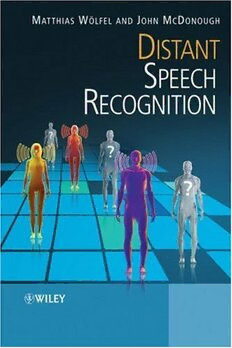Download Distant speech recognition PDF Free - Full Version
Download Distant speech recognition by Dr Matthias Woelfel, Dr. John McDonough in PDF format completely FREE. No registration required, no payment needed. Get instant access to this valuable resource on PDFdrive.to!
About Distant speech recognition
A complete overview of distant automatic speech recognition The performance of conventional Automatic Speech Recognition (ASR) systems degrades dramatically as soon as the microphone is moved away from the mouth of the speaker. This is due to a broad variety of effects such as background noise, overlapping speech from other speakers, and reverberation. While traditional ASR systems underperform for speech captured with far-field sensors, there are a number of novel techniques within the recognition system as well as techniques developed in other areas of signal processing that can mitigate the deleterious effects of noise and reverberation, as well as separating speech from overlapping speakers. Distant Speech Recognition presents a contemporary and comprehensive description of both theoretic abstraction and practical issues inherent in the distant ASR problem. Key Features: Covers the entire topic of distant ASR and offers practical solutions to overcome the problems related to it Provides documentation and sample scripts to enable readers to construct state-of-the-art distant speech recognition systems Gives relevant background information in acoustics and filter techniques, Explains the extraction and enhancement of classification relevant speech features Describes maximum likelihood as well as discriminative parameter estimation, and maximum likelihood normalization techniques Discusses the use of multi-microphone configurations for speaker tracking and channel combination Presents several applications of the methods and technologies described in this book Accompanying website with open source software and tools to construct state-of-the-art distant speech recognition systems This reference will be an invaluable resource for researchers, developers, engineers and other professionals, as well as advanced students in speech technology, signal processing, acoustics, statistics and artificial intelligence fields.
Detailed Information
| Author: | Dr Matthias Woelfel, Dr. John McDonough |
|---|---|
| Publication Year: | 2009 |
| ISBN: | 9780470714089 |
| Pages: | 584 |
| Language: | English |
| File Size: | 19.728 |
| Format: | |
| Price: | FREE |
Safe & Secure Download - No registration required
Why Choose PDFdrive for Your Free Distant speech recognition Download?
- 100% Free: No hidden fees or subscriptions required for one book every day.
- No Registration: Immediate access is available without creating accounts for one book every day.
- Safe and Secure: Clean downloads without malware or viruses
- Multiple Formats: PDF, MOBI, Mpub,... optimized for all devices
- Educational Resource: Supporting knowledge sharing and learning
Frequently Asked Questions
Is it really free to download Distant speech recognition PDF?
Yes, on https://PDFdrive.to you can download Distant speech recognition by Dr Matthias Woelfel, Dr. John McDonough completely free. We don't require any payment, subscription, or registration to access this PDF file. For 3 books every day.
How can I read Distant speech recognition on my mobile device?
After downloading Distant speech recognition PDF, you can open it with any PDF reader app on your phone or tablet. We recommend using Adobe Acrobat Reader, Apple Books, or Google Play Books for the best reading experience.
Is this the full version of Distant speech recognition?
Yes, this is the complete PDF version of Distant speech recognition by Dr Matthias Woelfel, Dr. John McDonough. You will be able to read the entire content as in the printed version without missing any pages.
Is it legal to download Distant speech recognition PDF for free?
https://PDFdrive.to provides links to free educational resources available online. We do not store any files on our servers. Please be aware of copyright laws in your country before downloading.
The materials shared are intended for research, educational, and personal use in accordance with fair use principles.

